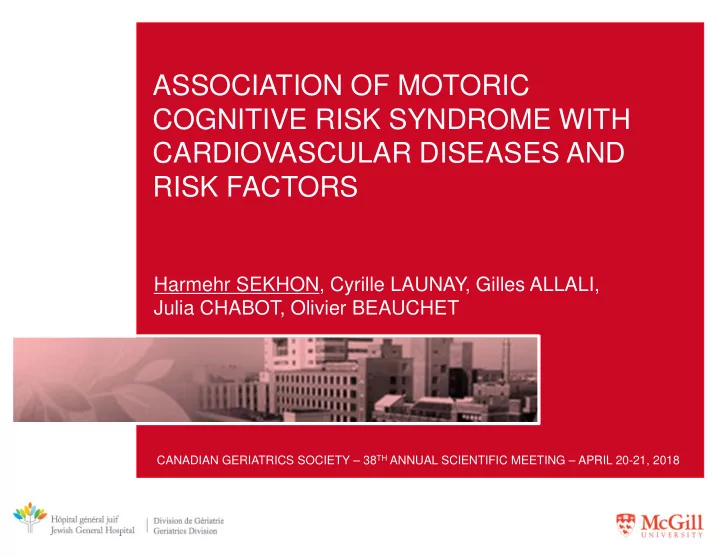

ASSOCIATION OF MOTORIC COGNITIVE RISK SYNDROME WITH CARDIOVASCULAR DISEASES AND RISK FACTORS Harmehr SEKHON, Cyrille LAUNAY, Gilles ALLALI, Julia CHABOT, Olivier BEAUCHET CANADIAN GERIATRICS SOCIETY – 38 TH ANNUAL SCIENTIFIC MEETING – APRIL 20-21, 2018
ASSOCIATION OF MOTORIC COGNITIVE RISK SYNDROME WITH CARDIOVASCULAR RISK FACTORS PRESENTER DISCLOSURES Presenter: Harmehr SEKHON Relationship with financial sponsors: None Discussion of Off-Label, Investigational, or Experimental Drug Use: No This program has received financial support from None This program has received in-kind support from None Potential for conflict of interest No
ASSOCIATION OF MOTORIC COGNITIVE RISK SYNDROME WITH CARDIOVASCULAR RISK FACTORS BACKGROUND NEED FOR IMPROVING DEMENTIA SCREENING _ Dementia is a major public health issue (high incidence and adverse consequences). Past decade characterized by increased interest in identifying and validating biomarkers for early diagnosis of dementia Need to optimize global accessibility of clinical dementia risk assessments (e.g., screening) in community-dwelling populations, in order to initiate effective preventive measures.
ASSOCIATION OF MOTORIC COGNITIVE RISK SYNDROME WITH CARDIOVASCULAR RISK FACTORS BACKGROUND MOTORIC COGNITIVE RISK SYNDROME _ New clinical syndrome combining: Subjective cognitive impairment: Perceived changes in cognition in the absence of objective evidence. Slow gait speed: Gait speed one SD or more below age-and sex- appropriate mean values established in the present cohort. Pre-dementia stage
ASSOCIATION OF MOTORIC COGNITIVE RISK SYNDROME WITH CARDIOVASCULAR RISK FACTORS BACKGROUND ASSOCIATION OF MCR WITH CARDIOVASCULAR DISEASES AND RISK FACTORS IS STILL A MATTER OF DEBATE _ MCR predicts both Alzheimer Disease (AD) and Vascular Dementia (VaD), but the strength of association between MCR and VaD is stronger than AD, suggesting a link with Cardiovascular Diseases and Risk Factors (CVDRF). CVDRF (e.g., high blood pressure, obesity and diabetes) may cause VaD. Mixed results about the association of MCR syndrome with CVDRF related to populations.
ASSOCIATION OF MOTORIC COGNITIVE RISK SYNDROME WITH CARDIOVASCULAR RISK FACTORS BACKGROUND ASSOCIATION OF MCR WITH CARDIOVASCULAR DISEASES AND RISK FACTORS IS STILL A MATTER OF DEBATE _ To date, no systematic critical evaluation of studies with the purpose of examining the association of MCR syndrome with CVDRF has been performed. Demonstrating that CVDRF were effectively associated with MCR syndrome, regardless of the origin of the populations, could be helpful to develop common global strategies for preventive measures for older individuals at risk for dementia.
ASSOCIATION OF MOTORIC COGNITIVE RISK SYNDROME WITH CARDIOVASCULAR RISK FACTORS BACKGROUND HYPOTHESIS AND OBJECTIVE _ Hypothesis: The profile of associated CVDRF could change across various populations. Objective: To quantitatively synthesize, with a systematic review and meta-analysis, the association of MCR with CVDRF.
ASSOCIATION OF MOTORIC COGNITIVE RISK SYNDROME WITH CARDIOVASCULAR RISK FACTORS METHODS DESIGN, SETTING AND POPULATION _ Systematic review and meta-analysis Medline (Pubmed) and EMBASE (Ovid, EMBASE) in February 2017 Search terms: “ motoric cognitive risk syndrome ” or “ motoric risk ” or “ motoric cognitive risk ” The selection criteria for the article: human studies, articles in English and French, original study with peer-reviewed publications in indexed scientific journals, MCR syndrome and CVDRF as outcomes, two groups of participants including MCR and non-MCR syndrome individuals Cardiovascular risk factors examined: Cardiovascular diseases, hypertension, diabetes, stroke and obesity
ASSOCIATION OF MOTORIC COGNITIVE RISK SYNDROME WITH CARDIOVASCULAR RISK FACTORS METHODS 5.9%
ASSOCIATION OF MOTORIC COGNITIVE RISK SYNDROME WITH CARDIOVASCULAR RISK FACTORS RESULTS CARDIOVASCULAR DISEASES OR > SIGNIFICANT ASSOCIATION
ASSOCIATION OF MOTORIC COGNITIVE RISK SYNDROME WITH CARDIOVASCULAR RISK FACTORS RESULTS HYPERTENSION OR > SIGNIFICANT ASSOCIATION BUT DIVERGENCES BETWEEN STUDIES
ASSOCIATION OF MOTORIC COGNITIVE RISK SYNDROME WITH CARDIOVASCULAR RISK FACTORS RESULTS DIABETES OR > NO SIGNIFICANT ASSOCIATION IN INDIAN POPULATION
ASSOCIATION OF MOTORIC COGNITIVE RISK SYNDROME WITH CARDIOVASCULAR RISK FACTORS RESULTS STROKE OR > SIGNIFICANT ASSOCIATION BUT FEW STUDIES
ASSOCIATION OF MOTORIC COGNITIVE RISK SYNDROME WITH CARDIOVASCULAR RISK FACTORS RESULTS OBESITY OR SIGNIFICANT ASSOCIATION BUT HETEROGENOUS NUMBER OF INDIVIDUALS BETWEEN STUDIES
ASSOCIATION OF MOTORIC COGNITIVE RISK SYNDROME WITH CARDIOVASCULAR RISK FACTORS GLOBAL RESULTS OR
ASSOCIATION OF MOTORIC COGNITIVE RISK SYNDROME WITH CARDIOVASCULAR RISK FACTORS DISCUSSION AND CONCLUSION MCR IS ASSOCIATED WITH CVDRF BUT… _ Significant association of MCR with CVDRF: Adverse consequences of CVDRF like cerebrovascular lesions and brain atrophy can both lead to memory complaint and slow gait speed. The type of CVDRF associated with MCR changed across the studied populations: _ Lowest Odd Ratio being reported for hypertension and the highest for stroke, the magnitude of variation ranging from 1.21 to 2.05 _ No significant association was reported in the Indian population, whereas it was present for American, Japanese and French populations.
ASSOCIATION OF MOTORIC COGNITIVE RISK SYNDROME WITH CARDIOVASCULAR RISK FACTORS DISCUSSION AND CONCLUSION MCR IS ASSOCIATED WITH CVDRF BUT… _ Together, these results suggest that factors such as ethnicity, environment and lifestyle may influence the association among populations. However, the meta-analysis indicates the presence of a robust and systematic significant association, regardless of the type of CVDRF (OR=1.38). Main limitations: _Limited number of studies _Heterogenous number of participants between studies _Variation in the definition of CVDRF across studies
ASSOCIATION OF MOTORIC COGNITIVE RISK SYNDROME WITH CARDIOVASCULAR RISK FACTORS PERSPECTIVES MCR IS ASSOCIATED WITH CVDRF… AND SO WHAT? _ These findings may help to elucidate the pathophysiological mechanisms explaining MCR syndrome and its association with the occurrence of dementia. What about Canadian population? _ Canadian Longitudinal Study of Aging What is expected? _ Better care continuum _ Decreased incidence of dementia and adverse consequences
THANK YOU! _ Questions? harmehr.sekhon@mcgill.ca CANADIAN GERIATRICS SOCIETY – 38 TH ANNUAL SCIENTIFIC MEETING – APRIL 20-21, 2018
Recommend
More recommend